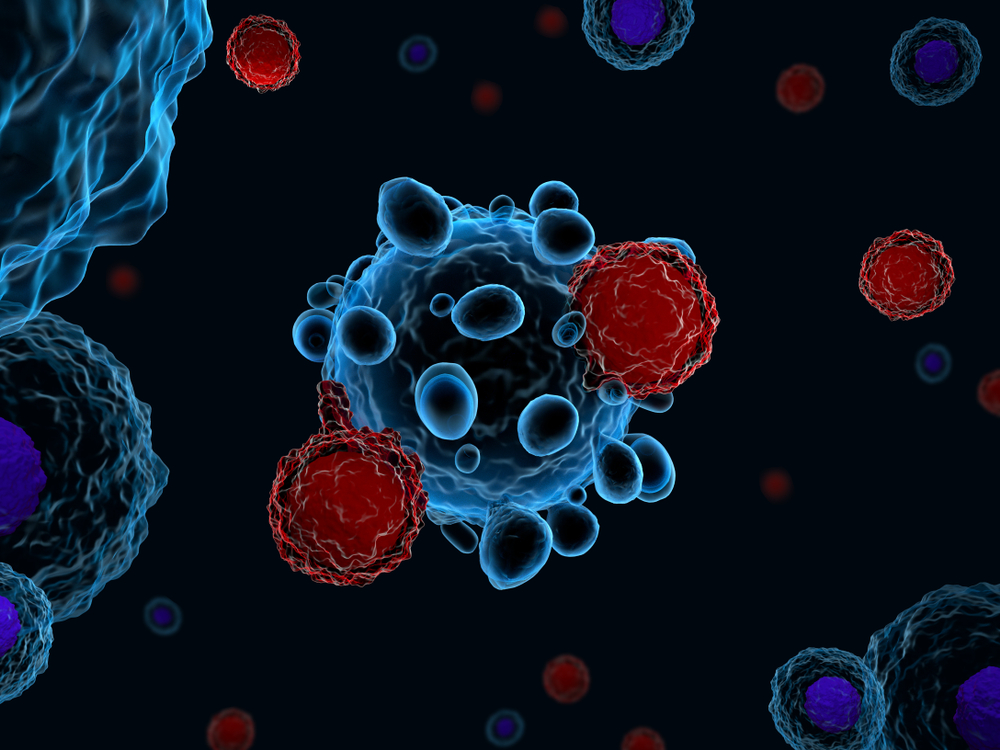#ACTRIMS2020 – Protein May Drive Process Causing T-cells to Attack Myelin
Written by |

A protein called dedicator of cytokinesis 8 (DOCK8) is key for the development and expansion of self-reactive immune T-cells that wrongly attack myelin, a study in a mouse model of multiple sclerosis (MS) found.
DOCK8 drives the migration and stimulating capacity of dendritic cells — immune cells that ‘teach’ T-cells to attack a given target. Limiting migratory dendritic cells by manipulating DOCK8, or through other means, could be a way of restricting autoimmunity in MS, the research team said.
These findings were presented by Estelle Betteli, PhD, at the Americas Committee for Treatment and Research in Multiple Sclerosis (ACTRIMS) Forum 2020, in West Palm Beach, Florida (Feb. 27–29). The presentation was titled “Lymphocyte-myeloid Cell Networks in MS.”
MS is caused by the immune system mistakenly attacking myelin, the insulating and protective protein coating of nerve fibers in the central nervous system (CNS; brain and spinal cord). Due to mechanisms still unclear, patients develop self-reactive immune T-cells that destroy myelin, and this is closely linked to CNS inflammation and nerve cell death.
Typically, for T-cells to launch a targeted attack, they first need to be “primed” by other immune cells. These are collectively known as antigen-presenting cells, including a group referred to as dendritic cells (DCs).
Dendritic cells are a heterogeneous family, with varied locations and behaviors, that act as ‘sentinels’ for the immune system, continuously sampling tissues to detect harmful microbes or other substances. They specialize in capturing an intruder’s proteins (antigens), and displaying pieces of them to T-cells so they know which targets to attack.
When dendritic cells detect foreign elements they quickly change their behavior, leaving the tissues where they reside and entering lymphatic vessels through which they migrate to lymph nodes. It’s here that they actively present antigens to T-cells.
In people with allergic or autoimmune conditions like MS, dendritic cells can incorrectly display pieces of proteins that are natural to a system — like myelin. In doing so, they prime T-cells to wrongly attack (self-react against) a person’s own cells and tissues.
Betteli and colleagues are interested in understanding what drives T-cells to initiate these self-reactive attacks, and the role of dendritic cells in this process.
They studied the DOCK8 protein, which is abundant in blood cells and regulates the internal structure, survival, and migration of immune cells, including dendritic cells.
DOCK8 is part of a larger family of proteins that play key roles in immune surveillance. Its levels were reported to be elevated in immune cells from MS patients, and it was also linked to susceptibility to MS-like disease in mice. Animals deficient for DOCK8 were seen to be protected against the disease.
To study DOCK8, the scientists genetically engineered mice to lack the protein solely on dendritic cells. After this, they induced MS-like disease in the animals by activating myelin-specific T-cells — a mouse model widely employed to study MS, called the experimental autoimmune encephalomyelitis (EAE) model.
Researchers observed that mice whose dendritic cells lacked DOCK8 developed less severe disease, compared to mice with a full expression of the protein (control mice).
“Absence of DOCK8 in DC [dendritic cells] limits EAE development,” Betteli said.
Dendritic cells deficient in DOCK8 were less also efficient at stimulating myelin-specific T-cells than their DOCK8-containing counterparts.
And a lack of DOCK8 reduced the percentage of dendritic cells migrating to lymph nodes, while leaving untouched the proportion of those cells that stay in tissues (resident dendritic cells).
A further analysis found that migratory, but not resident, dendritic cells were the first to be responsible for the proliferation of myelin-specific T-cells.
“Among the different DC [dendritic cells] subsets, only migratory DC efficiently stimulated [myelin-specific] T-cells,” Betteli said.
The team believes that these results are also relevant for humans, as they also have migratory dendritic cells (often referred to as mature dendritic cells).
“Therefore, our data demonstrate that migratory DC [dendritic cells], more than resident DC, are essential for the generation and proliferation of pathogenic T-cell populations that induce the development of EAE. Furthermore, DOCK8 expression is essential for the presence of migratory dendritic cells in the lymph node, and their capacity to prime pathogenic T-cells,” the researchers wrote.
“Taken together, our data suggest that limiting migratory dendritic cells through DOCK8 deletion, and possibly other mechanisms, could limit the development of CNS autoimmunity,” they concluded.


